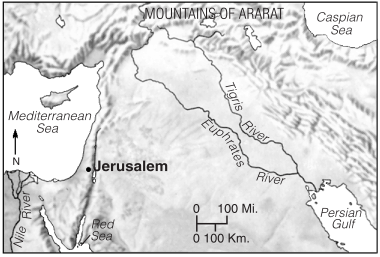
Mesopotamia: The Land between the Tigris and Euphrates
Open Bible Data Home About News OET Key
OET OET-RV OET-LV ULT UST BSB MSB BLB AICNT OEB WEBBE WMBB NET LSV FBV TCNT T4T LEB BBE Moff JPS Wymth ASV DRA YLT Drby RV SLT Wbstr KJB-1769 KJB-1611 Bshps Gnva Cvdl TNT Wycl SR-GNT UHB BrLXX BrTr Related Topics Parallel Interlinear Reference Dictionary Search
A B C D E F G H I J K L M N O P Q R S T U V W XY Z
MESOPOTAMIA
Name given by the Greeks to the land between the Tigris and Euphrates Rivers, an area today called al-Jazira, “the island,” by the Arabs. Mesopotamia, which means literally “between the rivers,” is applied to the land between and near those rivers down to the Persian Gulf. Much of it is included in Iraq, but some of it is in Syria, and a small part in Turkey.
Mesopotamia played a significant role in OT history. Much of the tightly compressed account of Genesis 1–11 was centered here. The Garden of Eden was situated in this area, for two of the rivers of Genesis 2:10-14 are identified as the Euphrates and the Tigris.
The prehistoric cultures of Mesopotamia are unknown. The historical periods are labeled by the names of various cities that dominated them, such as Ur and Isin-Larsa, or by the names of dynasties established in those places, for example, Ur III.

Mesopotamia: The Land between the Tigris and Euphrates
The southernmost part of Mesopotamia is known as Sumer and was populated by the Sumerians, who had a distinctive culture and a non-Semitic language, which was written in cuneiform script, as were most of the other languages of Mesopotamia. Farther north was the district called Akkad, which was also named Agade and had a Semitic population. Still farther north, along the Tigris, was the land that became Assyria, while to the far west was Syria, or Aram, and in between was Mitanni (c. 1400 BC). As portions of Mesopotamia slipped from hand to hand, various sections became parts of different empires, such as Hittite, Assyrian, Babylonian, Persian, Greek or Hellenistic, and Roman.
In the Hebrew OT the name for Mesopotamia is Aram-naharaim, “Aram of the two rivers.” Abraham sent his servant, Eliezer, to Aram-naharaim to find a wife for Isaac (Gn 24:10). In this context it has been suggested that the two rivers were the Euphrates and the Khabur. The account of the adventures of Jacob in this area does not use the term Aram-naharaim but employs instead the name Paddan-aram, “the field [or garden] of Aram” (28:2).
Balaam, the son of Beor, was from Pethor in Mesopotamia (Dt 23:4). During the period of the judges, Cushan-rishathaim, king of Mesopotamia, oppressed Israel for eight years, but the Lord brought deliverance through Othniel (Jgs 3:8-10).
When the Ammonites expected David to invade their territory because they had insulted his ambassadors, they hired chariotry from Mesopotamia and elsewhere to bolster their forces (1 Chr 19:6).
In the NT Mesopotamia is mentioned only twice. People from Mesopotamia were present on the day of Pentecost (Acts 2:9). Stephen, in his defense before the Sanhedrin, states that Abraham lived in Mesopotamia before he lived in Haran (Acts 7:2; see Gn 11:31).